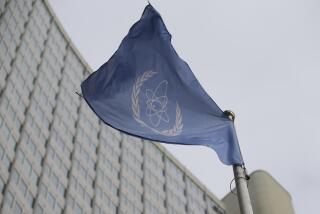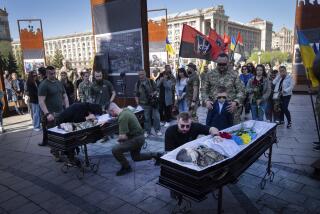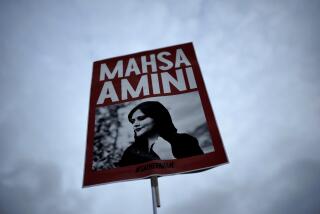U.N. nuclear agency faults Iran for not answering key questions
Reporting from Washington — Iran has stepped up production of enriched uranium and has refused to answer key questions about its nuclear development program, the United Nations atomic watchdog agency declared Friday in a strongly worded report that does little to resolve Western concern about whether Tehran is seeking to build a nuclear bomb.
U.N. nuclear inspectors continue “to have serious concerns regarding possible military dimensions to Iran’s nuclear program,” Yukiya Amano, director-general of the Vienna-based International Atomic Energy Agency, writes in the report issued Friday.
“As Iran is not providing the necessary cooperation … the agency is unable to provide credible assurance about the absence of undeclared nuclear material and activities in Iran, and therefore to conclude that all nuclear material in Iran is in peaceful activities,” Amano states.
Tension over Iran has risen sharply in recent weeks as the United States and the European Union have imposed additional sanctions on Tehran’s oil exports and banking sector. The strain comes amid reports of sabotage at Iranian nuclear and missile facilities and threats that Israel might launch a preemptive military strike on Iran’s nuclear sites.
Iran has stepped up its uranium enrichment efforts at several sites in recent months, including Fordow, a once-secret facility near the city of Qom, the report says. Tehran acknowledged the Fordow facility to the IAEA in 2009, after Western intelligence agencies say they first discovered it.
The arrays of centrifuges at Fordow, however, are less sophisticated than the system Iran initially intended to install, the report says.
Iran says it is enriching uranium for energy and other peaceful purposes, but highly enriched uranium can be used for nuclear weapons. The facility at Fordow has caused concern because it is deep underground and thus may be protected from a military airstrike.
The report indicates that Iran is enriching uranium to a level of 20%, a purity level higher than needed for reactors to produce electricity. Tehran says it is enriching nuclear fuel to 20% for use in a civilian research reactor. Experts say the material can be quickly upgraded to the 90% level needed for a bomb if Iran chooses to do so.
Iranian officials refused to allow IAEA inspectors to visit the Parchin military base on two recent trips. In 2000, Iran built a large explosives containment vessel at Parchin to conduct experiments that are “strong indicators of possible weapon development,” according to an IAEA report issued last November.
U.S. intelligence agencies years ago concluded that Iran’s leaders halted nuclear weapons development in 2003. The IAEA inspections are designed, in part, to see whether any illicit work has resumed, which would violate Iran’s obligations under the Nuclear Nonproliferation Treaty. In the Nov. 8 report, the inspectors warn that clandestine research on high-speed detonators and other technology “may still be ongoing.”
White House national security spokesman Tommy Vietor said the latest report “confirms what we already knew: Iran has continued to pursue its uranium enrichment program in violation of multiple United Nations Security Council resolutions without demonstrating any credible or legitimate purpose for doing so.”
Until Iran stops “stonewalling” international inspectors and suspends its enrichment program, “its isolation from the international community will only continue to grow,” Vietor said.
More to Read
Sign up for Essential California
The most important California stories and recommendations in your inbox every morning.
You may occasionally receive promotional content from the Los Angeles Times.











